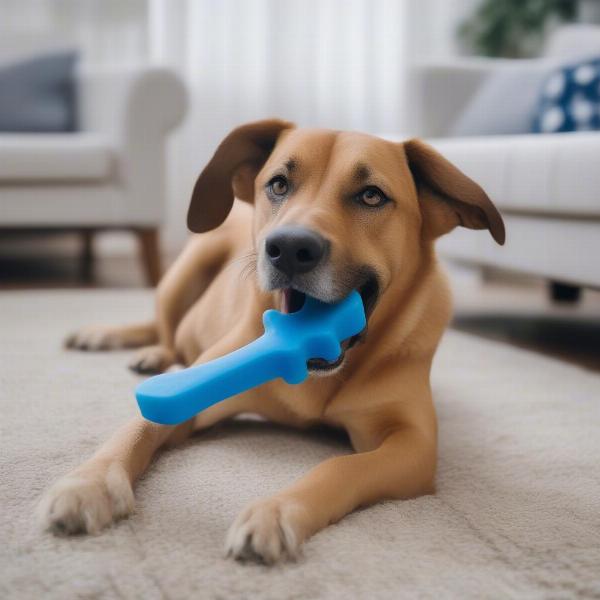Dog bones have been a canine staple for generations, offering both entertainment and potential health benefits. But not all dog bones are created equal. This comprehensive guide will delve into the world of dog bones, discussing the different types, their pros and cons, and how to choose the right one for your furry friend.
Understanding the Appeal of Dog Bones
Why do dogs love bones so much? Chewing on a bone fulfills a dog’s natural instinct to gnaw, helping to relieve boredom and anxiety. The act of chewing also releases endorphins, which have a calming and pleasurable effect. Beyond enjoyment, dog bones can contribute to dental health by scraping away plaque and tartar buildup, promoting fresher breath and healthier gums.
Choosing the Right Dog Bone: A World of Options
Navigating the vast array of dog bones available can be overwhelming. From rawhide to nylon, each type has its own set of advantages and disadvantages. Understanding these differences is key to making an informed decision for your dog’s safety and wellbeing.
Rawhide Bones: Proceed with Caution
Rawhide bones are popular, but they come with potential risks. While they can provide long-lasting chew time, rawhide can be difficult to digest and may pose choking hazards, especially for aggressive chewers. Some dogs may also experience stomach upset after consuming rawhide.
Nylon Bones: Durable and Long-Lasting
Nylon bones offer a durable and long-lasting alternative to rawhide. They are designed to withstand vigorous chewing and can help clean teeth effectively.  Dog playing with a nylon bone However, some dogs may chip off pieces and swallow them, which can cause digestive issues.
Dog playing with a nylon bone However, some dogs may chip off pieces and swallow them, which can cause digestive issues.
Natural Bone Options: Benefits and Considerations
Natural bones, such as beef or bison bones, offer a more natural chewing experience. They are packed with nutrients and can satisfy a dog’s instinct to gnaw. However, it’s crucial to choose appropriately sized bones to prevent choking and to supervise your dog while they chew. Cooked bones should be avoided as they can splinter and cause internal injuries. filled dog bones are a great option for providing a stimulating chew experience.
Dental Chews: Promoting Oral Health
Specifically designed to promote dental health, dental chews often have a textured surface that helps scrub away plaque and tartar. They are available in various shapes and sizes, making it easy to find one that suits your dog’s breed and chewing habits.
Dog Bone Safety Tips: Ensuring a Positive Experience
Ensuring your dog’s safety while enjoying a bone is paramount. Always supervise your dog while they are chewing, and promptly remove any bones that become small enough to be swallowed whole. Choose bones appropriate for your dog’s size and chewing strength. dog bone engine mount is not a suitable chew toy for dogs. For aggressive chewers, opt for durable options like nylon or heavy-duty natural bones. raw dog bones can be a good option for some dogs but should be given with caution.
What are the benefits of giving my dog a bone?
Giving your dog a bone can offer a multitude of benefits, from satisfying their natural chewing instincts to improving their dental health.
How can I tell if a bone is safe for my dog?
Selecting a safe bone involves considering your dog’s size, chewing habits, and the type of bone. Always avoid cooked bones, and opt for appropriately sized bones to prevent choking hazards. dog bones for heavy chewers are specifically designed to withstand powerful chewing forces.
Are there any alternatives to traditional dog bones?
Yes, several alternatives exist, including dental chews, chew toys, and even certain vegetables like carrots or celery. These options can provide a safe and enjoyable chewing experience.
Conclusion
Dog bones can be a valuable addition to your dog’s routine, providing both enjoyment and potential health benefits. By understanding the different types of dog bones, their pros and cons, and practicing safe chewing habits, you can ensure your furry friend enjoys a safe and rewarding chewing experience. large dog bones are specifically designed for larger breeds. Choosing the right bone and supervising your dog is crucial for their safety and wellbeing.
FAQ
- Are cooked bones safe for dogs? No, cooked bones can splinter and cause serious internal injuries.
- What should I do if my dog swallows a small piece of bone? Contact your veterinarian immediately.
- How often should I give my dog a bone? This depends on the type of bone and your dog’s individual needs. Consult your veterinarian for personalized advice.
- Can puppies have bones? Yes, but choose bones specifically designed for puppies and supervise them closely.
- Are there any bones I should absolutely avoid giving my dog? Yes, avoid cooked bones, poultry bones, and bones that are small enough to be swallowed whole.
- What are some good alternatives to bones for aggressive chewers? Durable nylon bones or heavy-duty natural bones are good options.
- Can giving my dog too many bones cause constipation? Yes, consuming too much bone material can lead to constipation.
ILM Dog is your trusted partner for comprehensive dog care information and advice. We are passionate about providing dog owners worldwide with the resources they need to raise happy, healthy dogs. From breed selection and health care to training and nutrition, ILM Dog offers expert guidance and practical tips for all stages of a dog’s life. We also specialize in providing guidance on choosing the right products and accessories for your canine companion. Contact us for personalized advice or explore our website for a wealth of information. Email: [email protected], Phone: +44 20-3965-8624. Visit ILM Dog today for all your dog care needs.